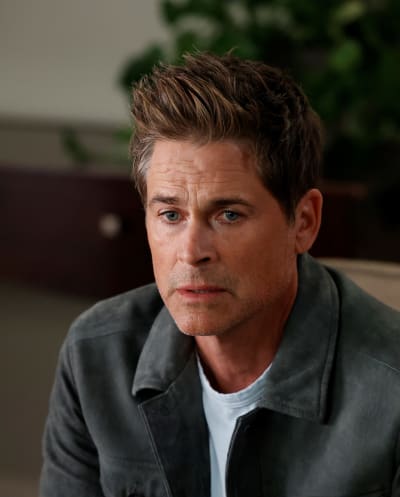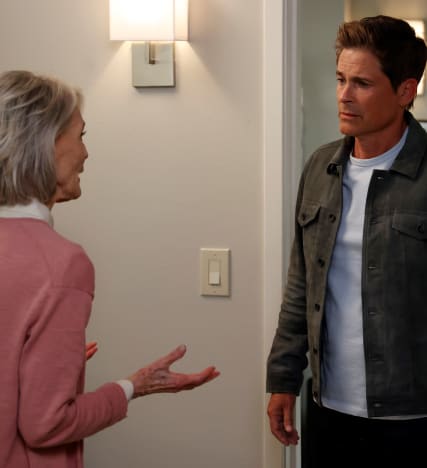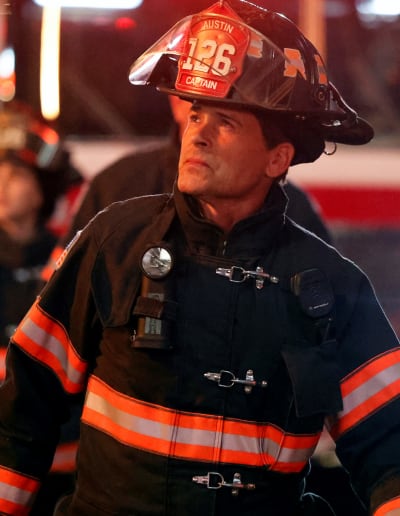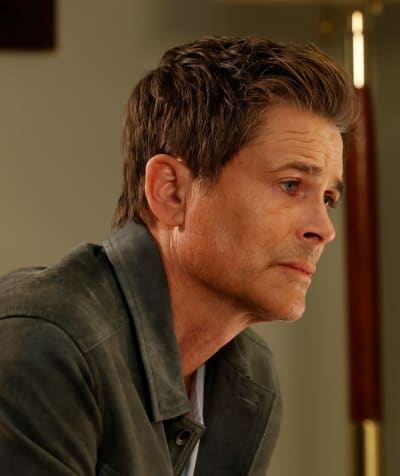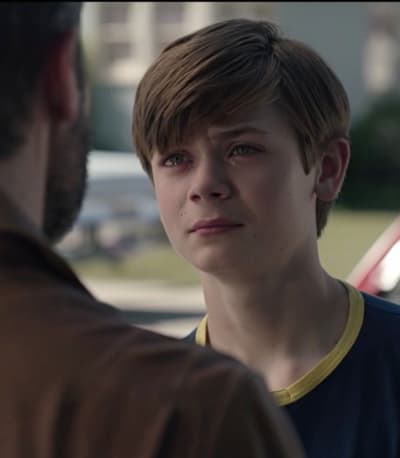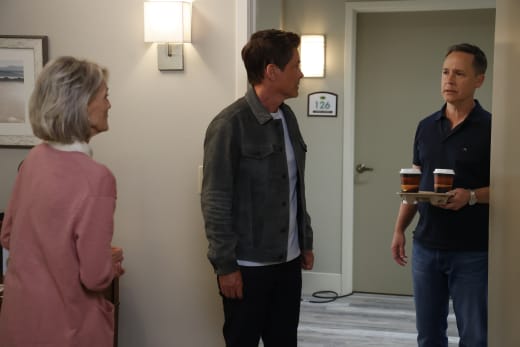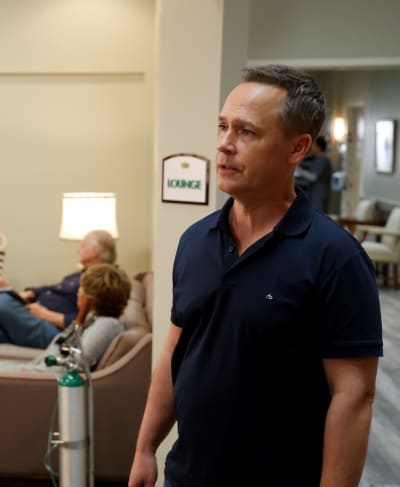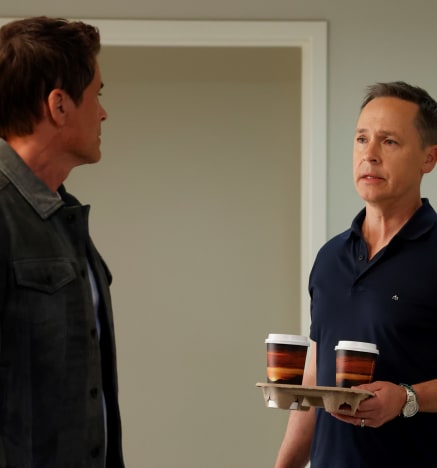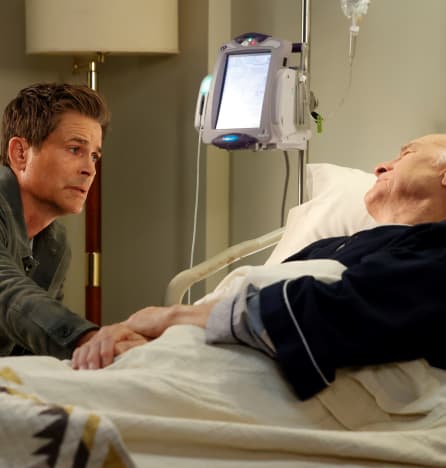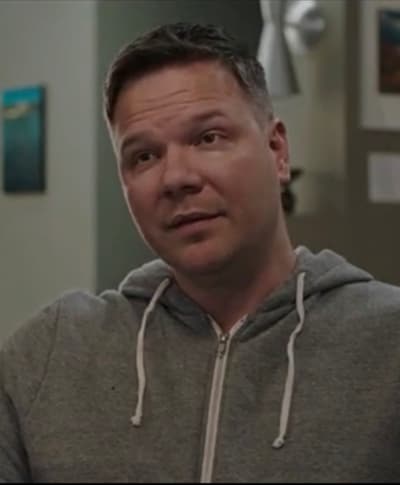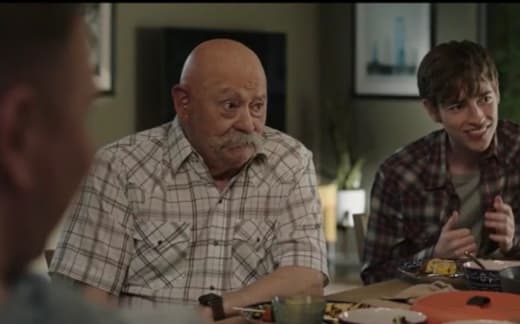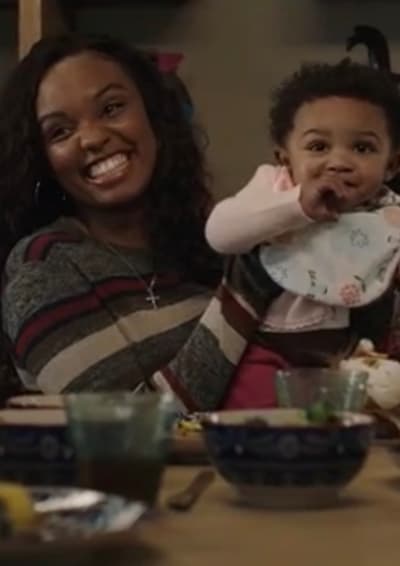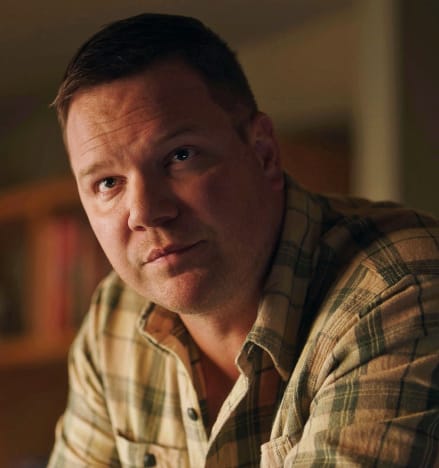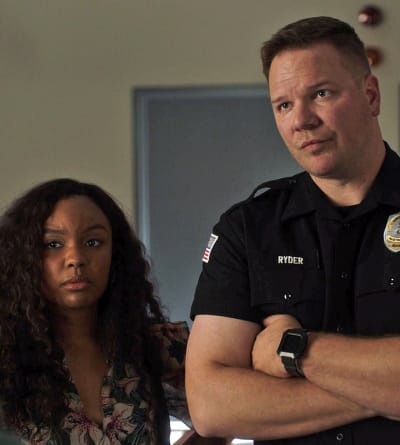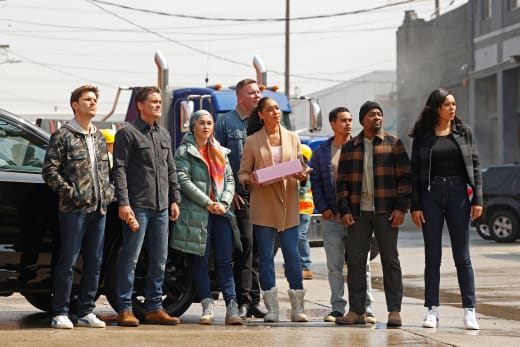It was a wonderfully saccharine and poignant installment focusing on fathers and sons.
One of the most notable aspects of 9-1-1: Lone Star Season 3 Episode 16 is how it was the perfect emotional payout for Owen’s series long-arc that managed to sneak up on us.
And it was balanced out well with more follow-up on Judd’s arc with Wyatt, too.
The series never officially has “Begins” like its sister show, but Shift-Less is the closest that we got to an Owen origin story. It had a similar vibe to one of the series’ best installments, 9-1-1: Lone Star Season 2 Episode 9.
While Owen’s arc didn’t dominate the entire hour as “Saving Grace” did with the Ryders, in Owen’s case, it worked out better since he tends to dominate regularly compared to many of the other characters.
We’ve often discussed how frustrating that is, especially when roughly half of the characters remain underdeveloped as characters and don’t get as much screentime or consistency with their arcs.
It’s one of the criticisms of the season, especially as we near the end of it with only a couple of installments remaining, and it still feels like half of the cast was lacking throughout it.
But this hour perfectly displayed how capable the writers are of following through with its storytelling even if we don’t immediately see it along the way.
In hindsight, Owen got the most consistent, well-thought-out, and executed season’s arc. Everything along the way led to this, and we got such a satisfactory, emotional payout.
I was wondering if you’d be back. I’m Helen, Walter’s wife. You’re Owen, aren’t you?
Helen
Owen hiding away from the 126 family when they thought their home would be ripped away from them makes sense and arguably had him mirroring his father, or what he felt Walter did when he gave up on their family.
Owen’s longstanding anger issues started subtly or played off mildly as amusing, only for it to build and become a legitimate issue that required him to face it head-on. It was all to get us to this moment of Owen confronting his past and how his brother’s death and his father’s abandonment shaped who he is now as a man, father, and captain.
Owen’s struggles in his dating life, the loss of his ex-wife, and neverending trauma — all brought him to that nursing home with his father.
The hour even addressed what has felt like a growing and noticeable distance between Owen and T.K. It was frustrating to watch when it felt like the Strand men don’t even orbit around each other anymore.
Based on this installment, it’s evident that the writers were conscientious and deliberate with every facet of Owen’s storyline this season, and it’s commendable and impressive. It even speaks to how capable and strong they are and can be with their storytelling.
Every aspect of Owen’s storyline, even when it was offputting, frustrating, or seemed downright absurd, led us to this point and came together brilliantly. Now, we can appreciate it for what it was when it was hard to do so before this.
I mean, clowns? The absurdity of the clown fiasco during 9-1-1: Lone Star Season 3 Episode 15 was so irritating, but now that we know that a young Owen saw that stupid Clown wallpaper in the waiting room as he watched his parents find out that his brother died, clowns take on a deeper meaning.
It doesn’t matter how old we are; sometimes, we have to go back to the beginning, or close to it, to get to the root of our problems and heal. We’ve always known Owen to be the man who survived so much trauma and impossible levels of grief, but it all began with the death of his younger brother, Tyler, whom he named T.K. after.
I was wondering if you’d be back. I’m Helen, Walter’s wife. You’re Owen, aren’t you?
Helen
The flashbacks to Tyler’s drowning were nerve-wracking, and the young actor who portrayed a young Owen was fantastic. Without a word, his depiction of Owen’s utter devastation in that waiting room was heartbreaking, and you felt for him when Owen and his mother left Walter behind in Los Angeles.
One can’t imagine the pain and guilt that Owen harbored at such a young age over Tyler’s death. He felt responsible, and when his family broke up shortly after it happened and his father disappeared from his life, he couldn’t help but believe it was all because of him.
It makes sense that he would get into a field where he can save lives and have some semblance of control. Hell, Owen’s reckless heroics as he hurls himself into the fray — a frustrating habit of his that suddenly makes sense too.
A young Owen didn’t get to his brother quickly enough, but he can make damn sure that he’ll risk it all to save as many people as possible. And deep down, he probably feels that it’s chipping away at that loss.
Owen: I just wanted to tell you that I love you and that I’m proud of you.
TK: I’m proud of you too.
Owen: And I want to say that I’m sorry that we don’t talk as much. It’s my fault.
Initially, it was incredibly frustrating that he took off to Los Angeles to see his father before he died, but he didn’t lean on T.K. or give his son the option of meeting his grandfather in all of this.
It only served as a painful reminder of how annoyingly distant Owen and T.K. have been all season despite losses, trauma, and near-death experiences.
And it remains agitating that he didn’t ask T.K. to accompany him, giving his son the chance to meet family and support Owen through this challenging task.
But it at least prompted Owen to call T.K. to tell him how much he loved him and apologize for the chasm between them for so long that it’s hard even to pinpoint when it happened.
Acknowledgment and a promise for improvement is a start, and while it’s too late into the season to see how that pays off with the Strand men’s relationship, it’s something to which we can look forward to next season.
It was emotionally gratifying when they had that moment and conversation, even via a video call.
And Owen had to face something unexpected, too. We knew going into this installment that Rob Lowe’s actual brother, Chad Lowe, would guest-star on the installment.
Ideally, it would’ve been better if we didn’t know going into the installment that they would play brothers on the series.
It either made everything confusing when we learned that the only brother Owen was aware of having died when he was a teen, or it ruined the “surprise” of Owen realizing that his father got remarried and had another son after he and his mother moved away.
It also made things puzzling when the two of them didn’t seem that far apart in age (there’s only a four-year difference between the Lowe brothers). We’re to believe that Owen was around 13 when Tyler died, and there was likely at least another year or two before Walter married Helen and had Robert.
Robert seemed like a nice man. It’s painful to hear him recount what Walter was to him as a father, and Owen learns that all of these family members surround Walter, but Owen didn’t get that same experience.
But Robert was wise and supportive. And he at least recognized what Owen was going through and understood that both Owen and Walter needed that moment and conversation with each other, which is more than one can say about Helen.
Seriously, Helen getting protective of her husband is perfectly human, but it was irritating when she wanted to deny Walter’s son the chance to say his peace. Wasn’t it already bad enough that Walter let his son go and didn’t have anything to do with him over the years?
Owen: All this time, I thought you didn’t want to be a father; it turns out you just didn’t want to be a father to me. And I’m not sure I blame you after everything. I’m the one who broke the family. Dad, I’m sorry. I’m sorry I couldn’t save him. I tried, I swear to God, I tried. I’m so, so sorry.
Walter: It’s not your fault, son.
Owen: Dad.
Walter: You were just a kid, alone. Nobody blamed you.
Walter’s responsibility as an adult was to maintain that relationship and fight harder for his son. I’m glad that he not only told Owen that Tyler’s death wasn’t his fault, but he apologized and owned up to his shortcomings as a father.
The conversation between the two men was emotional, and it went far better than one could’ve imagined. Owen had such a mature approach, going into that conversation thinking about his father’s perspective and how things came to be rather than allowing years of anger and bitterness to cloud the truth.
Lowe was at his best during that emotional scene at Walter’s bedside. And there was a strong sense of closure and healing at that moment that translated over to him possibly having a relationship with his half brother and knowing he needed to fix things between him and T.K.
The circle of fathers and sons and how that spans generations also extended to Judd, Wyatt, and in some ways, Stuart.
Robert: Hey. Did you find the words?
Owen: The words found me.
Robert: Good.
Owen: Thank you for giving me the time in there.
Robert: I’m Robert, by the way.
Owen: Owen
Robert: It’s nice to meet you, Owen.
Owen: You too.
Robert: Hey, Owen. Don’t be a stranger.
We were long overdue for some more progress on the Wyatt front. It felt like they dropped this bombshell storyline into our hands and then placed it on the backburner for far too long.
The hour got back into that and dug into the unresolved issues that the storyline presented.
Wyatt is a good kid, but he deserved to be angry, and it was a bit unrealistic how easily he adapted to things after finding out about Judd and Grace, and he didn’t blame anyone either.
But this hour finally gave Wyatt the space to experience the full breadth of his feelings, and it did the same for Judd. We needed to see Wyatt respond to things like a normal kid, so it was refreshing to hear that he had been acting out.
It was also hot A.F. to see Judd in full-blown, angry dad mode. My God, there will never be enough Jim Parrack as far as I’m concerned. The man reciting the phone book (look that up if you don’t know about those, kiddos) would be riveting.
Wyatt has that Ryder spirit, and he’s a chip off the old block with his penchant for getting into some trouble. It’s funny how parents end up with children who give them the same hell they raised as a youth.
Understandably, Stuart found the whole thing hilarious and got some twisted joy out of Judd experiencing fatherhood in this way. It was a bit odd to learn that he hadn’t met Wyatt up until that point.
I loved that Judd took Wyatt to the family ranch and opted to spend the day with him to get him on the right track. And it’s something that Grace could support, but she also showed how she’s always the level-headed, best half when she reminded Judd that he should tell Marlene about what happened.
Grace understood the importance of open communication. It is refreshing how these three individuals can successfully co-parent and navigate this unique situation that has led to this new, blended family they never anticipated.
It took a bit, but Wyatt opened up to Judd, and you could sympathize with what he had to say. The one thing that keeps being an unrealistic stickler here is how they keep going out of their way to avoid directing any blame toward Marlene.
Whether or not she would be deserving of it isn’t the issue. It’s just that it would be far more realistic if Wyatt felt some resentment and anger directed toward his mother for robbing him of the chance to know his father for years.
And it flat out doesn’t make any sense that Judd hasn’t been the least bit angry or bitter that she didn’t tell him about his kid. Judd and Wyatt missed out on 16 years together, and they have every right to be upset about that.
When I first came to look for you, I didn’t even feel like I was missing something in my life until I met you.
Wyatt
It’s no way of expressing that anger without some of it landing on Marlene. You felt for the kid when he admitted that he couldn’t even be happy sometimes because it reminds him of how much he missed out on with Judd and Grace.
And Judd understood that better than anyone. They needed to have that conversation, and it’s a wonder it took this long for it to happen.
Of course, it wouldn’t be 9-1-1: Lone Star if things didn’t get dramatic and stressful. Judd’s horse throwing him off was scary enough, but when they showed his bone sticking out of his leg, it reached new heights.
They’re so rude for hurting our Juddy like that!
It was an unorthodox way of bonding for the father and son, but that’s what happened, and Wyatt proved himself smart and capable. He saved his father, and it’s the sweetest thing. He even called him “dad” in the process.
And that affected Judd more than he could voice, even when he tried to put things into perspective with his father later. The bonding between Judd and Stuart was just as delicious and heartwarming as that between Judd and Wyatt.
Judd could appreciate everything that his father did for him, raising him, and he had a genuine moment to acknowledge his gratitude toward his dad for everything.
I suppose nothing puts that into perspective, like dealing with your own children. Whenever Wyatt refers to Judd as “dad,” you can visibly see how choked up and sentimental Judd gets, and it’s precious.
Overall, the hour was deceptively strong, and Lowe’s performance was incredible.
As a viewer, it made you appreciate how everything came together and culminated in this moment. It was a fantastic character arc.
I genuinely wish and crave for them to keep this same energy and apply it to its other characters. The series would be all the stronger for it. If Mateo, Paul, Marjan, and Carlos’ had arcs that were well-crafted and this rich, it would take their characters to new heights.
I’m not mad at my mom, okay? I’m just mad!
Wyatt
And if Judd, Grace, and T.K.’s writing were as consistent as Owen’s and even Tommy’s, Lone Star would be on the top of its game.
Over to you, Lone Star Fanatics. Did you enjoy this Owen and Judd father/son installment? Hit the comments below!
You can watch 9-1-1: Lone Star online here via TV Fanatic.
Jasmine Blu is a senior staff writer for TV Fanatic. Follow her on Twitter.
